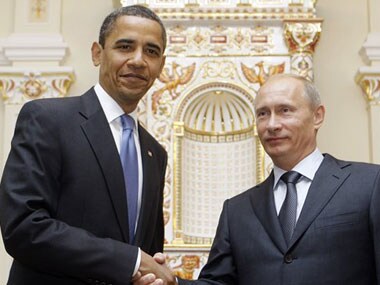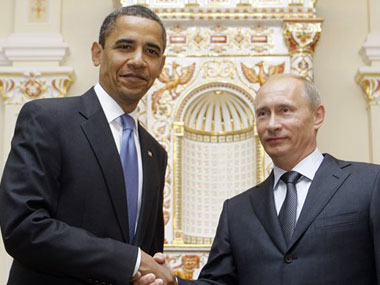Though international investigations into the 17 July downing of Malaysia Airlines Flight MH17 in Ukraine’s conflict zone Donetsk are just beginning, the United States-led western community is increasing the heat on Russia for its alleged sins of omission and commission in the massacre of 298 people in the sky. Clearly, the West also knows that hauling Russia over the coals for the tragedy is premature till the investigators arrive at a final conclusion on who was responsible for the downing of the plane, an exercise that will likely take weeks, if not months. Despite this the Western leaders are using the MH17 episode for settling political scores against Moscow, and Russia too is not holding back its punches. This is a dangerous situation. It is effectively Cold War II. [caption id=“attachment_1450855” align=“alignleft” width=“380”]
 Barack Obama and Vladimir Putin. Agencies[/caption] On Monday when the UN Security Council adopted a resolution condemning the downing of MH17 and calling for “a full, thorough and independent international investigation”, Samantha Power, the US ambassador to the United Nations, remarked thus: “We welcome Russia’s support for today’s resolution. But no resolution would have been necessary had Russia used its leverage with the separatists to provide unfettered access to the crash site in the crucial first days following the air tragedy.” Australia drafted the resolution while the Netherlands is leading the international investigation, the two countries which have borne the maximum brunt of the tragedy. The cornerstone of the West’s Russia-is-behind-it argument is a controversial recording of radio communications purportedly showing pro-Russian rebels talking of how they had accidentally shot down the Malaysian passenger plane, and tried to cover up their act. Russia’s UN envoy Vitaly Churkin denied this flatly saying that this conversation was recorded before the plane was shot down. Churkin also sought to pin the blame on Ukraine over the issue of the sophisticated Buk missile system that was used to down the plane that was flying at an altitude of 33,000 feet. He argued that a Ukrainian government-owned Buk missile system was in an area controlled by the rebels before the plane’s downing and then “hastily removed” after the tragedy. Churkin has warned that Ukraine will have to answer many questions during the international investigations. This is what he said: “Throughout the investigation Ukraine would have to answer many questions: about the actions of its air traffic controllers, the reasons for the movement of one of the Ukrainian Buk missile systems on 17 July right next to the area controlled by the militias. Why this missile defence system was moved immediately after the airplane crash? Why on 17 July Ukrainian air defence radar worked at the maximum intensity?” Besides, Russia has its own set of questions from the West in the MH17 episode. Sample a few as follows: 1. Why Ukraine deployed Buk missile launchers to east Ukraine in the first place, knowing full well that the rebels don’t have any planes? 2. Did the Ukrainian ATC authorities play a role in the MH17 tragedy? Why did Ukrainian air traffic controllers specifically ask the MH17 pilot to lower the plane’s altitude? Was it a ploy to bring the plane in the the anti-terrorist operation zone? 3. Why personnel of the Ukraine Security Service started working with the recordings of traffic control communications and with the data storage systems from radars without waiting for international investigators?
These recordings will be crucial for the investigators but the question is where are these recordings? While the international investigations into the MH17 downing are just gaining steam, the political attention turned to Brussels on Tuesday where Europe’s foreign ministers began their confabulations to decide on further and tougher sanctions on Russia. But further EU sanctions are not the way. EU is a divided house on the issue. Many members like France have their own commercial interests to watch out for. France is concerned about its $1.2 billion attack helicopters deal with Russia which Moscow had cleverly awarded to France recently even though Russia itself is a major helicopter exporting nation. Thus, France is already in favour of whittling down the proposed sanctions on Russia and underlined the need for targeting individuals and companies, rather than coming out with blanket sanctions on the entire economic sectors of Russia. Whatever course international politics takes on the MH17 episode, straws in wind make it clear that the Russia-West spat is getting uglier and the world is staring at Cold War II. The writer is Firstpost Consulting Editor and a strategic analyst who tweets @Kishkindha
Barack Obama and Vladimir Putin. Agencies[/caption] On Monday when the UN Security Council adopted a resolution condemning the downing of MH17 and calling for “a full, thorough and independent international investigation”, Samantha Power, the US ambassador to the United Nations, remarked thus: “We welcome Russia’s support for today’s resolution. But no resolution would have been necessary had Russia used its leverage with the separatists to provide unfettered access to the crash site in the crucial first days following the air tragedy.” Australia drafted the resolution while the Netherlands is leading the international investigation, the two countries which have borne the maximum brunt of the tragedy. The cornerstone of the West’s Russia-is-behind-it argument is a controversial recording of radio communications purportedly showing pro-Russian rebels talking of how they had accidentally shot down the Malaysian passenger plane, and tried to cover up their act. Russia’s UN envoy Vitaly Churkin denied this flatly saying that this conversation was recorded before the plane was shot down. Churkin also sought to pin the blame on Ukraine over the issue of the sophisticated Buk missile system that was used to down the plane that was flying at an altitude of 33,000 feet. He argued that a Ukrainian government-owned Buk missile system was in an area controlled by the rebels before the plane’s downing and then “hastily removed” after the tragedy. Churkin has warned that Ukraine will have to answer many questions during the international investigations. This is what he said: “Throughout the investigation Ukraine would have to answer many questions: about the actions of its air traffic controllers, the reasons for the movement of one of the Ukrainian Buk missile systems on 17 July right next to the area controlled by the militias. Why this missile defence system was moved immediately after the airplane crash? Why on 17 July Ukrainian air defence radar worked at the maximum intensity?” Besides, Russia has its own set of questions from the West in the MH17 episode. Sample a few as follows: 1. Why Ukraine deployed Buk missile launchers to east Ukraine in the first place, knowing full well that the rebels don’t have any planes? 2. Did the Ukrainian ATC authorities play a role in the MH17 tragedy? Why did Ukrainian air traffic controllers specifically ask the MH17 pilot to lower the plane’s altitude? Was it a ploy to bring the plane in the the anti-terrorist operation zone? 3. Why personnel of the Ukraine Security Service started working with the recordings of traffic control communications and with the data storage systems from radars without waiting for international investigators?
These recordings will be crucial for the investigators but the question is where are these recordings? While the international investigations into the MH17 downing are just gaining steam, the political attention turned to Brussels on Tuesday where Europe’s foreign ministers began their confabulations to decide on further and tougher sanctions on Russia. But further EU sanctions are not the way. EU is a divided house on the issue. Many members like France have their own commercial interests to watch out for. France is concerned about its $1.2 billion attack helicopters deal with Russia which Moscow had cleverly awarded to France recently even though Russia itself is a major helicopter exporting nation. Thus, France is already in favour of whittling down the proposed sanctions on Russia and underlined the need for targeting individuals and companies, rather than coming out with blanket sanctions on the entire economic sectors of Russia. Whatever course international politics takes on the MH17 episode, straws in wind make it clear that the Russia-West spat is getting uglier and the world is staring at Cold War II. The writer is Firstpost Consulting Editor and a strategic analyst who tweets @Kishkindha
Consulting Editor, Firstpost. Strategic analyst. Political commentator. Twitter handle @Kishkindha.
)